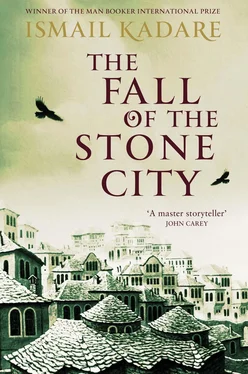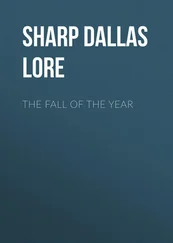“Louder!” he thought, without knowing whom he might be addressing. His feet carried him instinctively to the office of the Interior Ministry. His mind was vacant. Then he realised that he had been talking to the loudspeaker. It was not blaring as loud as it should, nor did the mountains of Lunxhëria look sufficiently sombre. “Bad news for me,” he thought.
At the office his heartbeat steadied. All his comrades were there. With bloodshot eyes and without a word, they embraced each other as they arrived, as if at a funeral. He wrapped his arms round Arian Ciu’s neck and could not suppress a sob.
A hundred yards away the same was happening at the Party Committee. Decorated war veterans, angrily red-eyed, stood in groups in front of the door. Couriers entered the building, only to emerge with even grimmer expressions than before.
At one o’clock a collective wail from the children went up from the yard of the primary school. Many people could stand it no longer and fled, shutting themselves up in their homes. Others who had taken to their beds during Stalin’s long illness struggled to rise from them.
That afternoon people gathered in public halls and courtyards to listen together to the radio broadcast of the rally of mourning from the capital. The announcer’s trembling voice described the scene in Skanderbeg Square in Tirana, where the nation’s leaders knelt in front of the dead man’s statue. In a halting voice the Leader swore eternal loyalty on behalf of all Albanian communists.
Some people fainted and were carried to the hospital. By the post office, Remzi Kadare, roaring drunk, pointed a finger at the emergency entrance. Amid his sobs of despair, he was telling a story that his listeners took to be about the big event of the day, but was in fact his recollection of the fatal poker game when he had lost his house.
On other streets could be heard the shouts of unfortunate people as they were dragged by the hair to the Interior Ministry, accused of having laughed at the memorial rally instead of crying, although they swore blind they hadn’t been laughing at all but were as broken-hearted as everybody else. But for some reason their weeping had turned into a snigger. They were beaten all the harder.
After the rally Shaqo Mezini told his colleague that his legs would not carry him any longer and he was leaving. They could call for him if necessary.
At home he collapsed into a leaden sleep. When he woke up it was dark. He had a momentary sensation of being suspended in a void, above a kind of abyss of grief and fear. Stalin was gone. He no longer had. . What else could he have? Speak!
He shook his head, assailed by a cruel and unexpected recollection of the white stomach of his fiancée and the dark regions beneath her garters. He felt a pang at having had so little chance to savour them.
The pain ripped through his chest and the scream he suppressed was more violent than the one that came from his throat. His idol Stalin was no longer in this world; worse, his enemy Gurameto still was.
What could be more unjust? Shaqo Mezini shuddered with a strange fear at the prospect of being left alone in this world of sorrows with this monster Gurameto. It was unthinkable. He imagined the doctor’s cynical smile. “He’s gone, your little father’s gone, he’s left you all.” And his flesh crept again.
No, he thought. Never.
With uncertain steps he left the house. The streets were deserted. A street lamp flickered but refused to die. The Interior Ministry building was in semi-darkness. The guard on night duty looked at him in pity. In the office he found a note from Arian Ciu, “I’m at home. Call me if anything happens.”
A short time later the two men’s boots were heard, scraping against the cobbles on the street up to the castle. Neither of them spoke; it appeared that first one man and then the other were sleepwalking. They climbed for a long time, as if through clouds. Shaqo Mezini thought he saw the other man’s boots strike sparks, like the hooves of a horse he had once seen in childhood struggling to climb the cobbled street.
The iron gates to the Cave of Sanisha creaked dolefully. Gurameto was lying just as they had left him, stretched out on the straw.
Shaqo Mezini touched his knees with the toecap of his boot. “Wake up, Stalin’s dead!” The prisoner’s expression did not change under the pale light of the torch. The black patches and smears of dried blood gave his face the appearance of a crudely painted mask.
“This makes you laugh, eh?”
The mask did not change. Its expression could mean anything: laughter, grief, entreaty, anger, menace. (“When he heard the news of Stalin’s death, he laughed. Before my very eyes. I lost it. I couldn’t control myself.”)
The investigator’s eyes wandered from his face to his bandaged hand. (“No, I was not trying to destroy evidence. I didn’t know his fingers had been cut off.”)
Silently he motioned to Arian Ciu and the two started to drag the prisoner by the feet.
The empty handcuff on the prisoner’s right hand clanged as it hit the floor.
“Where’s the other one?” Shaqo Mezini asked.
“Who?”
“The other one, I said. The little doctor.”
“There’s no other doctor.”
Shaqo Mezini stopped in his tracks. His expression had never looked so menacing.
“I mean. . they’ve been separated for several days, you know.”
Their voices echoed indistinctly in the long vaulted passage. Where? How? Perhaps he was in the next chamber.
The superintendent of the cave joined them.
“He’s been in that room for a while. The young trainees beat him. You know better than I do. . The first-year intake.”
In each chamber their voices sounded different.
“Maybe he was shot by mistake,” the superintendent continued. “There’s been a lot of confusion in the last few days, believe me.”
Some of the chambers were pitch dark. In one, two points of light danced like cat’s eyes.
“What are those sparks?” asked the investigators.
“It’s Blind Vehip,” the superintendent replied guiltily. “The lads were making fun of him. They stuck phosphorescent stones in his eye sockets.”
“How do they find time for things like that?”
“One of the cave guards was telling me about it. I think they just found this guy,” Arian Ciu said.
“He’s a goner,” the superintendent said, throwing the beam of his torch onto Blind Vehip’s face.
“It doesn’t look like him,” Shaqo Mezini said. “Never mind. Big deal. Put him in that other handcuff.”
“That needs a signature here,” the superintendent said in a voice of entreaty, stretching out a piece of paper.
Shaqo Mezini did not reply. His hands were still occupied.
When he felt the other man tied to his wrist, Dr Gurameto gave the first signs of life. He was trying to say something.
“Don’t get me into trouble, boss,” said the superintendent.
The investigator looked at him with contempt. “Stalin’s dead! Don’t you understand that? It’s chaos everywhere.”
“I know,” the superintendent replied in a sheepish voice. “But what’s a poor man like me to do? Rules are rules.”
They were close to the entrance to the cave, and felt the cold night air.
“Here,” the superintendent said, pointing to a place on the sheet of paper. “‘Reason for prisoner’s removal: visit to crime scene’.”
Much later Big Dr Gurameto’s final hours were reconstructed with considerable accuracy from the record of the autopsy, the two judicial files and the testimonies of Arian Ciu, the superintendent of the Cave of Sanisha and the driver. The statements of Shaqo Mezini and Blind Vehip were not taken into account because of the confused mental state of both men.
Читать дальше












